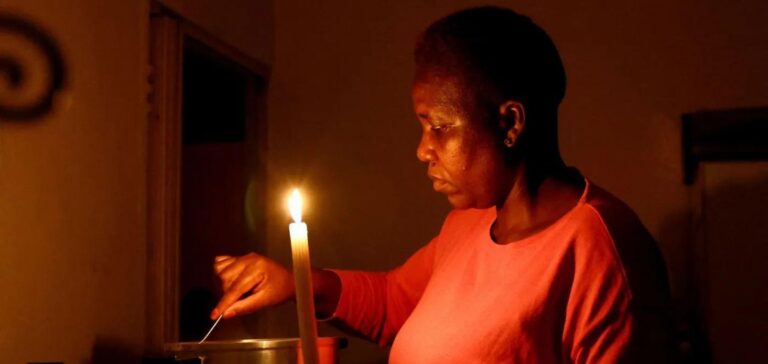Every night or so, it’s the same ritual. Mamadou Haïdara and his wife spend long hours chatting in their darkened living room in Bamako, the capital city of Mali, which is subject to constant power cuts. No fan to cool down, no battery for the cell phones… the stifling evenings follow one another, and we have to improvise solutions. “I bought a lot of fans. I share them with some of my children and with our cleaning ladies,” explains Mamadou Haïdara, a private sector executive, as he waved his new acquisition.
To shorten the ordeal in the cozy house in the Baco Djicoroni neighborhood, the Haïdara go to bed early, but the children struggle to sleep. The blackouts last at least two hours in this central area, and sometimes all night. The Haïdara family is among the 50% of Malians who have access to electricity, out of a population of 21.9 million, according to World Bank figures. Infrastructure is struggling to keep up with the growing population, which is increasing by about 3 per cent a year, according to the World Bank, in one of the world’s poorest countries, much of which is plagued by jihadism and insecurity.
Fed up
At home and at work, the hours seem long when the temperature exceeds 40 degrees during the hot season. “We spend all day together doing nothing, just chatting. It’s a discouraging situation. So we are forced to sit around” because of the lack of electricity, laments Ibrahim Konaté, head welder in a metal workshop in Bamako. “It’s painful for a worker to leave home and see load shedding at work. It’s like we come and go empty-handed,” he says. These cuts weigh on the economy. “In this hot weather, people need fresh produce. When products are not fresh, customers refuse to buy them. We are the ones who suffer the consequences,” said Issa Dicko, manager of a food store.
“People don’t have the same temperament. Some customers get angry,” says Oumar Yattare, a cashier in a restaurant in the capital. In the regions of Segou, Sikasso, or Mopti, the inhabitants of several localities have demonstrated in recent months. In Gao, in the north, power outages lasted several days in a row. Villages in rural areas often rely on local generators or companies, but in the cities, the national company is the focus of criticism. The Energy Company of Mali (EDM), nicknamed “Energy of Evil” by some users, is unable to meet the demand for electricity, which is growing by an average of 10% per year, according to the Ministry of Energy. This is due to the fact that the thermal power plants are antediluvian and consume a lot of fossil fuels.
Untapped potential
A report by the Ministry of Energy in 2019 points to “a very high production cost due to thermal generation, which currently leads to a deficit of nearly 50 Fcfa (0.75 euros) on the average selling price of the kWh”. Selling its electricity at a loss, the company accumulated a colossal debt. On March 28, the West African Development Bank (WADB) agreed to set up a CFA 45 billion (about ’68 million) debt repayment program. The aim is to “ensure the continuity of electricity supply to the Malian population and to support the country’s economic and social development”, according to the BOAD. Ultimately, the authorities hope to take advantage of Mali’s energy potential, whose hydroelectric and photovoltaic resources are largely untapped. Users like Mamadou Haïdara have to wait and see: “They advertise, they show us convoys of generators, they tell us that such and such a power station is being finished… We are still waiting”.





















